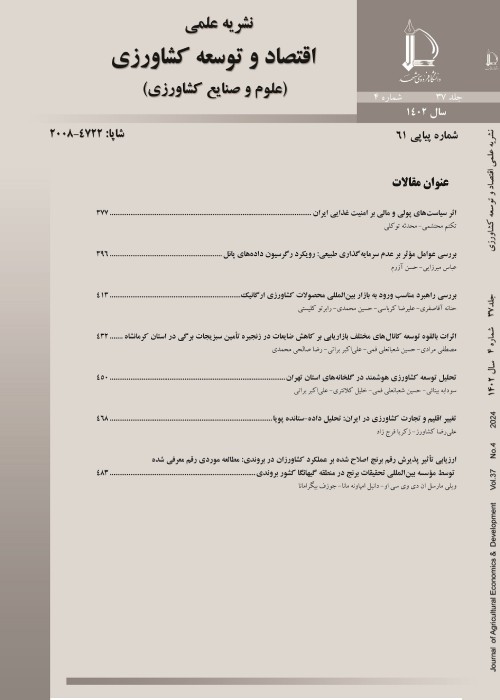Presenting a Model for Explaining the Antecedents of Intention to Use Electronic Word of Mouth in Purchasing Organic Agricultural Products
Organic agricultural products play an important role in the food basket of the community health development. Many researchers have proven that organic agricultural products are better and safer for human health, and unhealthy products are a threat for society. Increasing health problems and food-related diseases have made consumers to give more attention to these products purchase. There has been an increase in organic products popularity due to their health benefits and positive environmental impact.Shahdone store is one of the natural, complete and organic products stores in the country that serves online and in person with the aim of providing healthy, complete and natural raw materials. Healthy nutrition and modification of consumption pattern towards healthy, whole and natural products is one of the main goals of this collection. The focus of the company is on online sales and trust plays an important role in this type of purchase. To improve the business and introduction of this type of trades in Iran, word of mouth, especially electronic word of mouth, are very important and since this study examines the antecedents of intention to use electronic word of mouth in purchasing organic agricultural products at Shahdone, it will be beneficial for the company. The study focused on organic agricultural products, which are useful for the development of Shahdone and similar companies operating in the field of agriculture, to understand consumers' intentions and attitudes toward word of mouth. Also, for people in the community whose health is important, this research can be effective in promoting organic products. Therefore, the present study investigates the impact of social capital dimensions and trust on social media, attitude toward electronic word of mouth and intention to use electronic word of mouth in purchasing organic products.
The statistical population of this study consisted of all consumers of organic agricultural products in Shahdone stores, who used the products of this company during the collection of research data in February of 2018. The population was considered unlimited and 476 samples were selected using available sampling method. To collect data, a questionnaire containing 42 questions was designed by reviewing the literature on research variables. Also, two questions were compiled to measure demographic variables (education, gender). To measure and confirm the validity of the questionnaire, content validity, construct validity were examined. In order to evaluate the content validity, a number of questionnaires were distributed among university professors and premiers. Sensibility and comprehensibility of the questions and the appropriateness of the variables were examined. Experts opinions were used to improve questionnaire questions. For construct validity, factor analysis was used in the form of measurement model. Cronbach alpha coefficient was used to assess the reliability of the questionnaire. According Cronbach alpha coefficient, the questionnaire has a satisfactory reliability. SPSS and LISREL statistical software were used to analyses the research data and test hypotheses.
The findings of this study showed that attitudes toward electronic word of mouth are influential on the intention to use electronic word of mouth in purchasing organic agricultural products, on the other hand, there are some antecedents before obtaining attitudes toward electronic word of mouth which include; social capital in social media and trust in social media.
The results of the first and third hypotheses of the study indicate that voluntary social media participation has an impact on competency and behavioral stability, but the second hypothesis was not confirmed. Social media engagement when it comes to the sense of altruism and volunteering to give information, it gradually builds the ability to influence people, so having people on social media and through social media can impact others. The results of hypotheses fourth, fifth and sixth indicate that adherence to social commitments in social media affects the competence of influencers, the honesty of reputable people and their behavioral stability. People who are committed to social commitment, including indicators of doing the right thing, observing fairness, performing social duties, and a sense of responsibility to the community can help and influence others as a worthy person. Hypothesis seventh states that collaboration in social media affects its competence. The eighth and ninth hypotheses were not confirmed. People who help others, and have expertise in organic products, can play a vital role in people health. The results of the tenth and eleventh hypotheses of ethical-cultural interactions in social media influenced the competence and honesty of reputable people, but the twelfth hypothesis of ethical-cultural interactions in social media did not support behavioral stability. Expanding the culture of using healthy products will allow more people to participate in organic products. One of the problems with organic products is the exaggeration of the benefits of organic products, which should be minimized by cultural planning for these products. Hypothesis thirteenth states that common values in social media influence the competence of influencer and fourteenth and fifteenth hypotheses were not confirmed. Having commonalities and closeness of ideas makes others more important to people. When people are close to each other, they are more concerned about others and try to pay more attention to the consequences of their suggestions. The results of hypotheses sixteenth, seventeenth, and eighteenth indicate that influential competence, honesty of reputable people, and respect for behavioral stability in social media influence attitudes toward electronic word of mouth. Hypothesis nineteenth states that attitude towards electronic word of mouth influenced intention to use electronic word of mouth in purchasing organic agricultural products, this hypothesis was confirmed. The emerging attitude towards electronic word of mouth led to intention to use electronic word of mouth. Organic farming, or acceptance of information by the individual, before purchase.
- حق عضویت دریافتی صرف حمایت از نشریات عضو و نگهداری، تکمیل و توسعه مگیران میشود.
- پرداخت حق اشتراک و دانلود مقالات اجازه بازنشر آن در سایر رسانههای چاپی و دیجیتال را به کاربر نمیدهد.


